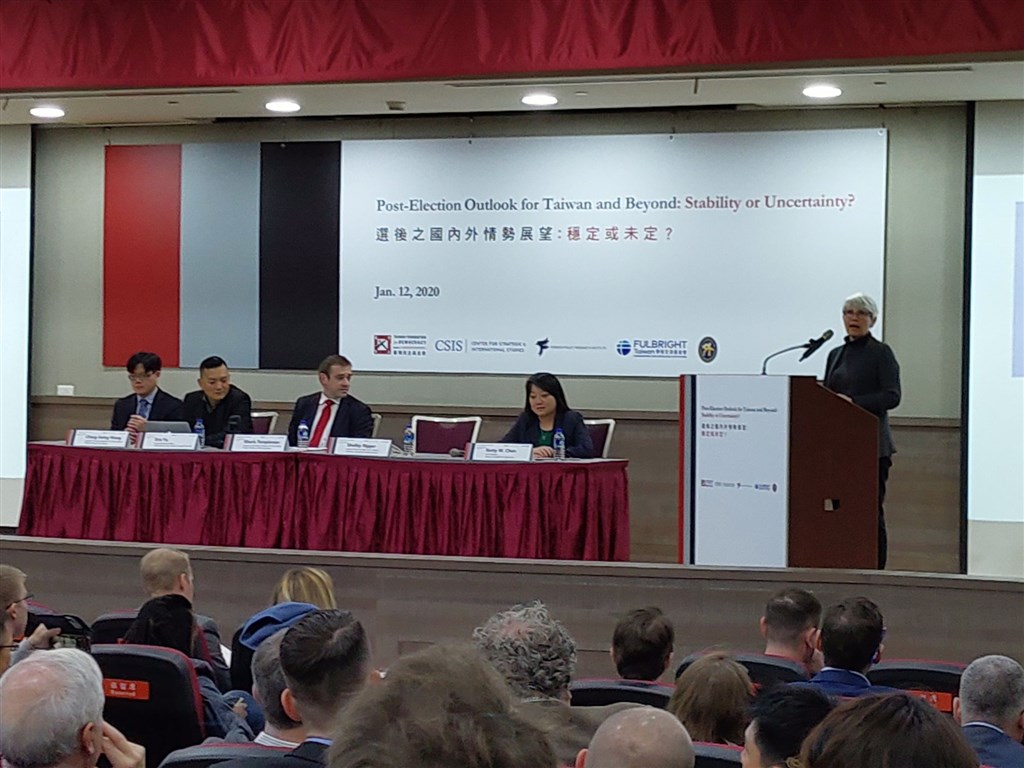Taipei, Jan. 13 (CNA) China is likely to increase its pressure on Taiwan on many fronts as a result of Saturday's presidential and legislative elections, foreign and local analysts who observed the polls said at a workshop Sunday afternoon.
President Tsai Ing-wen (蔡英文), whose campaign focused on protecting Taiwan's sovereignty from China, won re-election by 19 points over the Kuomintang's (KMT) Han Kuo-yu (韓國瑜), who was perceived by many as being friendly to Beijing.
Tsai's Democratic Progressive Party (DPP) also maintained its majority in the Legislature, meaning that the Taiwan independence-leaning party will maintain complete control of Taiwan's government for the next four years.
Beijing cut off official contact with the Tsai administration during her first term and has pressured Taiwan because of her party's stance.
It poached several of its diplomatic allies, ran military missions not far from Taiwan, and kept its citizens from visiting Taiwan on more than one occasion, hurting Taiwan's tourism sector, and that may not change after Tsai's re-election, according the experts.
"There is a significant possibility that things will take a turn for the worse, depending mostly on what Beijing does," Jacques deLisle, director of Asia Program, Foreign Policy Research Institute (FPRI) based in Philadelphia, said during the workshop.
According to deLisle, coercive actions such as military muscle flexing and the poaching of allies, and economic incentives such as luring Taiwanese to work in China and lowering barriers of entry are likely to continue, he said.
China's carrier battle groups' sailing through the Taiwan Strait and overflights of Chinese fighter jets will probably increase in frequency, he warned, and argued that military might could be the last tool left in Beijing's toolbox to influence Taiwanese attitudes.
The scenario where Beijing pursues an armed conflict is unlikely, however, due to high direct and indirect costs, a possible U.S. intervention and wider security implications for the region, deLisle said.
Domestically, there is little reason for Tsai to change her approach toward Beijing because she and the DPP have now been elected twice with a similar stance, which rejects the "one-China principle" and "1992 consensus," deLisle said.
Both of those formulations either state directly or imply that Taiwan is part of China, something most Taiwanese do not accept.
At the same time, any attempt by Taiwan to change the direction of cross-Taiwan Strait relations could hurt relatively robust U.S.-Taiwan relations at present, deLisle said.
Other analysts echoed deLisle's views.
"Certainly, in the Xi (Jinping) administration, if a tight grip results in failure, the response will be to tighten the grip more and the reflection is 'we should have tightened earlier,'" said Jude Blanchette, Freeman Chair in China Studies at the Center for Strategic and International Studies (CSIS).
Chinese President Xi is capable of tactical and rhetorical shifts, Blanchette said, but there is no indication his administration will fundamentally rethink its policy on issues of core territorial and political importance."
Lai I-chung (賴怡忠), president of the Prospect Foundation, said a change in Xi's Taiwan policy is unlikely because doing so would be tantamount to admitting to a mistake, which would pose a risk to his position atop the Chinese Communist Party.
On the effects of the elections on Taiwan internally, Shelley Rigger, Brown Professor of East Asian Politics at Davidson College in the U.S., said the election results suggested that not all of Tsai's supporters were fans of the DPP.
This was illustrated by the difference in the number of votes received by Tsai and by the DPP in the legislative political party vote.
She warned that the DPP's victory in the presidential election, which centered heavily on external relations, did not guarantee a victory in the next local elections in late 2022, which could focus more on her domestic agenda.
Kharis Templeman, adviser to the Project on Taiwan in the Indo-Pacific at Stanford University's Hoover Institution, said the KMT needs younger candidates who can speak the language of people under 40 and its new party chairman needs to focus on a youth strategy.
The KMT also has to adjust its position on key issues related to relations with China, such as the 1992 Consensus, because it seems detached from reality, Templeman said.
The policy was applied in 2008 when a KMT administration gained power and established warmer relations with Beijing, but the China of 2008 is not the China of 2020, he said.
Analysts agreed that external events such as Xi's speech in January 2019, in which he reiterated the one China principle and the "one country, two systems" model for Taiwan, the Hong Kong protests, a divided KMT, the selection of Han as the KMT's presidential nominee, and sovereignty issues, were the main factors that contributed to the victory of Tsai and the DPP.
The workshop, titled "Post-Election Outlook for Taiwan and Beyond: Stability or Uncertainty," was organized by the Taiwan Foundation for Democracy (TFD), and co-organized by the Foundation for Scholarly Exchange (Fulbright Taiwan), Center for Strategic and International Studies (CSIS), and the FPRI.
